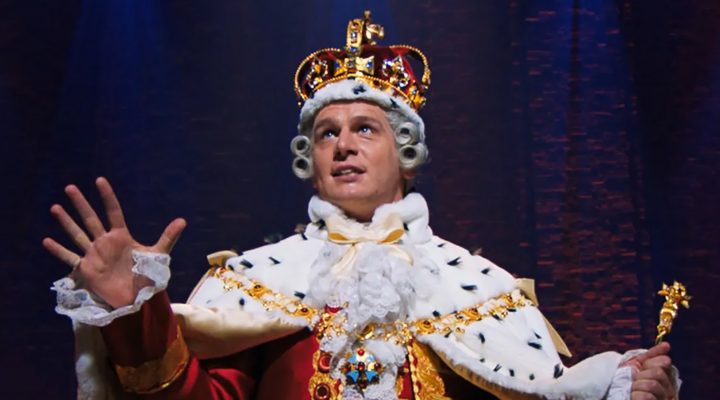Who’d a thought that just prior to commemorating our overthrow of a king, the U.S. Supreme Court would reinstate monarchy?
That might be an exaggeration, but only a teeny-weeny one. With today’s Supreme Court ruling, presidents of the U.S. have “at a minimum, a presumptive immunity from prosecution for all his official acts.”
And what unofficial acts might a president make? Any prosecutor would have to prove, beyond a shadow of a doubt, that the president was acting unofficially. The matter now goes back to the D.C. federal court to decide the official v. unofficial boundary. May be a job opening for a telepathist. Good luck with that.

Ken Sehested
If ever there were a Rubicon to be crossed, today, in U.S. history, it happened. As it happens, no, not every person is subject to the law. Already in 2019 former President Donald Trump presciently claimed that Article II of the Constitution gives him the power “to do whatever I want.”
Key Trump advisers are already talking about a “post-Constitutional order” and the theory of unitary executive authority — highfalutin words for the divine rights of kings. Trump’s evangelical consiglieri corps has years of providing theological cover.
When asked about how he could support someone with a profligate character like Trump, Robert Jeffress, pastor of First Baptist Church of Dallas, said, “I don’t want some meek and mild leader or somebody who’s going to turn the other cheek. I want the meanest, toughest SOB I can find to protect this nation.”
You and I both have friends and trusted acquaintances who argue, as July rolls around, that we should distinguish between nationalism and patriotism, ought to reclaim our Independence Day affection for and love of country shed of its hubris and belligerence.
“To love one’s country, though, means we first have to tell the truth.”
To love one’s country, though, means we first have to tell the truth. Some will resort to the piety, “My country, right or wrong.” But that’s like saying, as G.K. Chesterton pointed out, “My mother, drunk or sober.
Because our virtues as a nation are considerable, we tend to think our vices unremarkable. Such is not the case. And if we are to rightly interpret our condition, to expose our pretension, we simply must take seriously the whole story. Sometimes an intervention is the most loving thing we can do.
As I write, my Canadian friends are celebrating their July 1 Canada Day, their nation’s birth anniversary — which they managed to achieve without a war. Two decades ago, responding to an article on the history of U.S. imperial ambitions — where I mentioned a once-threatened invasion of Canada by the U.S. — a friend in Canada, Scripture scholar Ray Hobbs — responded by saying, “not only threatened but carried out — in fact, four times.”
Those invasions never were mentioned in my history classes (or, likely, in yours).
Heather Cox Richardson points out other excluded background information surrounding our nation’s War of Independence. As late as 1763, at the conclusion of what is referred to here as the French and Indian War, British colonists experienced an economic boom. Moreover, with the French relinquishing claims to land west of the Appalachian Mountains, the prospect of yet more free land and natural resources fueled entrepreneurial ambition.
However, Britain had no desire to fund yet another expensive war with Native Americans, which would surely happen if colonists began flooding west across the mountains. Such expansion was outlawed by the Parliament, which also passed multiple tax legislation affecting the colonies to help pay for the war.
For sure, the championing of freedom as a political virtue was an express ideal leading to the founding of the United States. But woven throughout — then as now — were pecuniary interests. Money is free speech, according to the U.S. Supreme Court, first in the 1976 Buckley v. Valeo case, widened further in the 2010 Citizens United v. Federal Election Commission decision.
Or, to put it baldly, the wealthy (and a corporation is now a “person” as stipulated by the Citizens United case) get more than one vote.
“As has been said, money talks. Louder still as the decimal points accumulate.”
As has been said, money talks. Louder still as the decimal points accumulate.
Democratic aspiration and commercial gain have been bound together since the arrival of the first English immigrants to our shores. But as Jon Meacham points out in Gospel: God, the Founding Fathers, and the Making of a Nation, of the 3,805 words in the 1606 First Charter of Virginia, only 3% are about God, the rest about commercial enterprise. As Captain John Smith of the Virginia Company wrote, “Faith was their color, when all their aim was nothing but present profit.”
There was more piety in Puritan Massachusetts, of course. But their exercise of religious freedom was for their own kind. Meacham quotes the English Lord Bishop of Salisbury complaining: “Every party cries out for Liberty & toleration, till they get to be uppermost, and then will allow none.” In fact, the1650 Connecticut Code bluntly stipulates, “If any man shall have or worship any God but the Lord God, he shall be put to death.’”
There is no doubt in my mind that the Declaration of Independence represents the most politically far-reaching ideas of its time, beginning with those majestic lines of the second paragraph:
We hold these truths to be self-evident, that all men are created equal, that they are endowed by their Creator with certain unalienable Rights, that among these are Life, Liberty and the pursuit of Happiness. — That to secure these rights, Governments are instituted among Men, deriving their just powers from the consent of the governed.
One of the great historical ironies associated with the Declaration of Independence is the fact that Ho Chi Minh, emerging leader of the Democratic Republic of Vietnam — against which the U.S. fought its longest war of the 20th century — quoted extensively from the Declaration in the founding of his party in September 1945.
But between the issuance of the Declaration and the writing of the U.S. Constitution several years later, profound differences in economic policy emerged, threatening to sever the ties that had united the colonies in the war against British rule.
Slavery already had become the dominant economic generator in the Southern colonies (with the collaboration of Northern financiers, insurers and shipbuilders), where industrial scale agriculture blossomed — and would compete, in the decades to come, with the Northern colonies’ industrial-scale manufacturing.
The authoring and editing of the U.S. Constitution was fraught with tension, most explicitly over the question of slavery. The resulting compromise ended with the sanctioning of enslavement.
The “Father of the Constitution,” James Madison, attacked slavery early in the Constitutional Convention, stating, “We have seen the mere distinction of colour made in the most enlightened period of time, a ground of the most oppressive dominion ever exercised by man over man.”
“Such was the moral ambiguity built into the Constitution’s framers.”
In line with Madison’s conviction, Thomas Jefferson attacked the trade in human bondage, calling it a “cruel war against human nature itself, violating its most sacred rights of life and liberty” — though he himself profited greatly from the institution.
Such was the moral ambiguity built into the Constitution’s framers. To be sure, Jefferson did not believe that African Americans were social equals. (Nor did future President Abraham Lincoln, who, like many white abolitionists, supported repatriation of slaves to Africa.)
Jefferson described them as being “incapable as children” and admitted that maintaining slavery was like holding “a wolf by the ear, and we can neither hold him, nor safely let him go.”
In the end, the writers reached a compromise. Three provisions in the final draft of the Constitution provided partial limitations on the practice: the Three-Fifths Clause, the ban on Congress ending the slave trade for 20 years, the fugitive slave clause, and the slave insurrections.
Yet to hide its ignominy, the final draft resorted to euphemisms rather than use the words “slave” or “slavery.”
If the temporary confederation of colonies (for the purpose of ending British rule) were to survive as a coherent nation-state, the financial boon of chattel slavery had to be warranted.
The lofty sentiment of the Declaration’s “all men are created equal” was a myopic aspiration. The celebration of freedom was literally for men only, and not even for all men. Voting rights were largely restricted to white property owners.
Slavery would not be abolished for another 76 years with the ratification of the 13th Amendment to the Constitution. The franchise for women wouldn’t be approved until 1920; and nearly a half-century more before the Voting Rights Act assured Black voting rights. Even now, the U.S. Supreme Court and state legislatures are chipping away at those voting rights provision.
“The framers implicitly affirmed that, yes — in contradiction to the New Testament — both God and Mammon can be served simultaneously.”
The virtues of democratic governance celebrated on our nation’s Independence Day have from our founding been in competition with the interests of a “free” market economy. Although the word “God” is absent from the Constitution, the framers implicitly affirmed that, yes — in contradiction to the New Testament — both God and Mammon can be served simultaneously.
The instability of these competing aspirations was evident from the beginning. It was Jefferson who wrote, in 1816, “The end of democracy and the defeat of the American Revolution will occur when government falls into the hands of lending institutions and moneyed corporations.”
This sentiment later would be expressed in the writing of President Abraham Lincoln: “I see in the near future a crisis approaching that unnerves me and causes me to tremble for the safety of my country. … Corporations have been enthroned and an era of corruption in high places will follow, and the money power of the country will endeavor to prolong its reign by working upon the prejudices of the people until all wealth is aggregated in a few hands and the Republic is destroyed.”
Then again, in the 20th century, President Woodrow Wilson complained: “If monopoly persists, monopoly will always sit at the helm of government. I do not expect monopoly to restrain itself. If there are men in this country big enough to own the government of the United States, they are going to own it.”
President Theodore Roosevelt went so far as to say, “All contributions by corporations to any political committee for any political purpose should be forbidden by law.”
As has been said, money doesn’t just talk in politics, it also silences.
Any accurate accounting of the competing interests in our nation’s founding must be attentive to the prophetic protestation of the great abolitionist Frederick Douglass’ July 5, 1852, speech, “What to the Slave is the Fourth of July?”
“If there are men in this country big enough to own the government of the United States, they are going to own it.”
“Had I the ability, and could I reach the nation’s ear, I would today pour out a fiery stream of biting ridicule, blasting reproach, withering sarcasm and stern rebuke,” he said. “For it is not light that is needed, but fire; it is not the gentle shower, but thunder. We need the storm, the whirlwind and the earthquake. The feeling of the nation must be quickened; the conscience of the nation must be roused; the propriety of the nation must be startled; the hypocrisy of the nation must be exposed; and its crimes against God and man must be proclaimed and denounced.”
His assessment is as indisputable now as then. The slave trade was the original sin of our nation. Clearly, there have been sporadic, courageous and efficacious movements to right that wrong, and we rightly recollect and celebrate those narratives.
We do so not to exhaust or satisfy the longing for justice, but to inform, to sharpen and to animate the ongoing struggle, to lay claim, as Dr. King reminded in his 1963 “I Have a Dream” speech, to that “promissory note” of freedom’s “inalienable rights of life, liberty and the pursuit of happiness.”
And to do so, we must move beyond King-quoting.
The provocative words of 18th-century patriot Thomas Paine never have been more prescient than to our current political climate. When reflecting “on the precariousness of human affairs,” he said, a “constitution of our own” based on the rule of law must be established.
“If we omit it now, some (dictator) may hereafter arise, who laying hold of popular disquietudes, may collect together the desperate and the discontented, and by assuming to themselves the powers of government, may sweep away the liberties of the continent like a deluge.”
Ken Sehested is the author and editor of prayerandpolitiks.org, an online journal at the intersection of spiritual formation and prophetic action.
Related articles:
This Fourth of July, let us reclaim patriotism | Opinion by Mark Wingfield
In ‘Hamilton,’ King George has Calvin on his side | Opinion by Rick Pidcock


